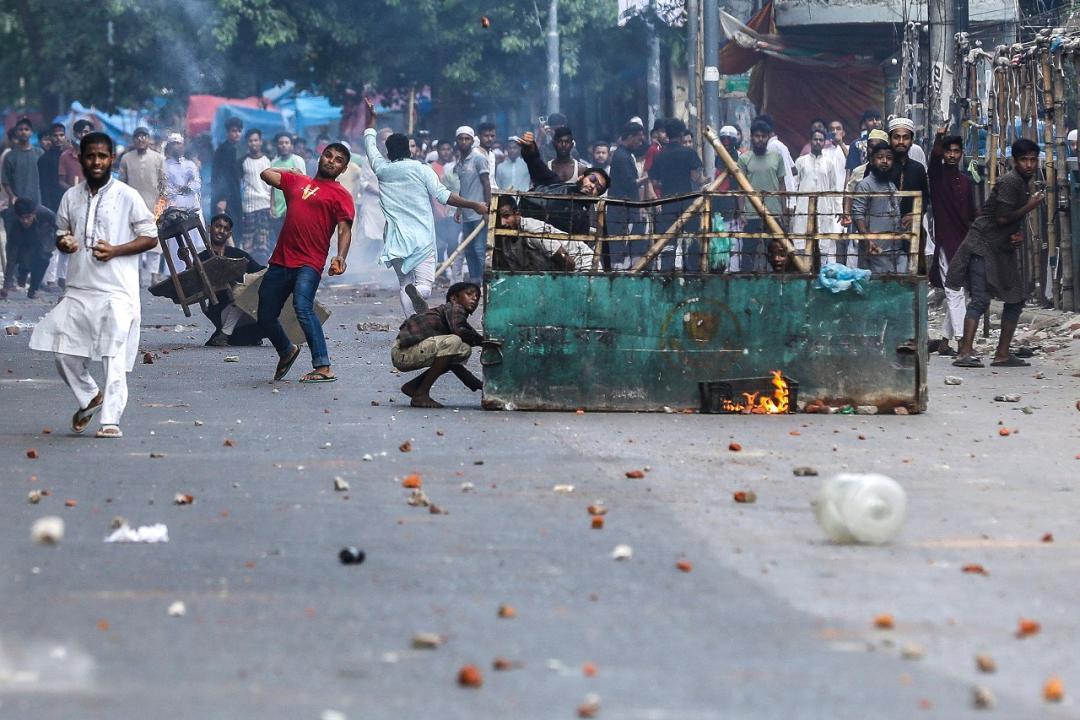Police and protesters clashed in the streets and at university campuses in Dhaka and other cities across the South Asian country

Pic/AFP
Huge protests across Bangladesh escalated into deadly violence this week with clashes between student protesters, security officials and pro-government student activists over a quota system for government jobs.
ADVERTISEMENT
Police imposed a strict curfew across Bangladesh and military forces patrolled parts of the capital on Saturday to quell further violence after days of clashes over the allocation of government jobs left several people dead and hundreds injured. The curfew follows what was likely the deadliest day yet in the weeks of Bangladesh protests despite a ban on public gatherings.
According to reports, the death toll has mounted to 114.
The Bangladesh protests, which began weeks ago but escalated sharply when violence erupted Tuesday, represent the biggest challenge to Prime Minister Sheikh Hasina since she won a fourth consecutive term in office after elections in January that were boycotted by the main opposition groups.
Police and protesters clashed in the streets and at university campuses in Dhaka and other cities across the South Asian country. Authorities moved to block online communications by banning mobile and internet services.
Here’s all you need to know:
Why are they protesting?
At the heart of the demonstrations is a quota system that reserves up to 30 per cent of government jobs for family members of veterans who fought in Bangladesh’s 1971 war of independence against Pakistan.
Protesters want to abolish this system, which they say is discriminatory and benefits supporters of Prime Minister Sheikh Hasina’s Awami League party, which led the independence movement. They want it replaced with a system that’s based on merit.
Even though job opportunities have grown in some parts of the private sector, many people prefer government jobs because they are seen as more stable and lucrative. But there aren’t enough to go around — each year, some 400,000 graduates compete for around 3,000 jobs in the civil service exam.
Under the quota system, government jobs are also reserved for women, disabled people and members of ethnic minorities, but students have mainly protested against jobs reserved for veterans’ families.
What’s happened so far?
The Bangladesh protests, which have drawn tens of thousands out on the streets, began late last month but tensions escalated on Monday when student activists at Dhaka University, the country’s largest, clashed with police and counter-protesters backed by the ruling Awami League.
The next day, violence continued to roil campuses across Bangladesh. More clashes were also reported on Wednesday and Thursday and paramilitary forces were deployed to patrol the streets of major cities.
In response, major universities said they will close until the situation is resolved in order to protect students.
The protesters say they will continue to demonstrate but are open to discussions with the government. More violence took place on Thursday in Dhaka and elsewhere in the country as police fired tear gas at protesters, according to police officials and local television.
What does the government say?
Hasina has defended the quota system, saying that veterans deserve the highest respect for their contributions to the war regardless of their political affiliation.
Her government has also accused the main opposition parties, the Bangladesh Nationalist Party and the right-wing Jamaat-e-Islami party, of fueling chaos. The BNP has backed the students’ calls for shutdown on Thursday.
On Wednesday, authorities also raided the headquarters of the BNP and arrested several activists from the party’s student wing.
The clashes come months after Hasina maintained power in an election that was boycotted by opposition parties and saw opposition members jailed ahead of the polls.
Why are the students protesting now?
This isn’t the first time there’s been uproar over this issue. In 2018, Hasina’s government halted the quotas after mass student protests.
However, the High Court nullified that decision last month and reinstated the quotas after relatives of the 1971 veterans filed petitions, sparking the latest round of protests. The Supreme Court suspended that decision and promised to rule on the issue on August 7. Despite this, the protests have persisted.
“I am requesting all to wait with patience until the verdict is delivered,” Hasina said in a televised address Wednesday evening. “I believe our students will get justice from the apex court. They will not be disappointed.”
What’s next?
The Supreme Court suspended the High Court’s reinstatement of the quotas after a government appeal. It has set August 7 as the date when it will hear the government’s challenge to the High Court ruling.
Hasina’s government says it agrees with students on doing away with the quota, a position it is expected to reiterate before the Supreme Court. But student protesters are demanding a legal amendment against the quotas.
(With inputs from Agencies)
 Subscribe today by clicking the link and stay updated with the latest news!" Click here!
Subscribe today by clicking the link and stay updated with the latest news!" Click here!







